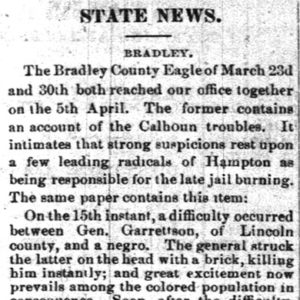calsfoundation@cals.org
Hampton Lynching of 1872
On March 12 or 13, 1872, a jailed African-American man alleged to have assaulted a white man named Tom Tatum was killed by a mob that stormed the Hampton (Calhoun County) jail and set it on fire. As is often the case, reports are conflicting, and it is hard to sort out the facts.
On April 6, an account in the Memphis Daily Appeal, which references the March 28 edition of the Magnolia Flower, reported that “several weeks ago” an unidentified Black man attempted to kill Tatum. The alleged assailant fled, and a group of African Americans captured him near Pine Bluff (Jefferson County). He was put in jail in Hampton pending trial. According to the Appeal, “an enraged set of outlaws,” well disguised, went to the jail on the night of March 12, killed the Black guard, set fire to the jail, and guarded it until it burned down. The report also noted that accounts of the event were “so conflicting that it is impossible for us even to attempt to give a correct account of the affair.” The Appeal decried the murder, saying that “the strongest arm of the law should be used to bring the robbers to justice.” Citing the Bradley County Eagle of Warren (Bradley County), it also mentioned a meeting of the citizens of Hampton “at which resolutions were adopted condemning in no measured terms this fearful outrage.” That same day, the Arkansas Gazette also referenced the Eagle in discussing the incident, noting, “Strong suspicions rest upon a few leading radicals of Hampton” as the perpetrators. The report alleged that “the deed was done by colored men, at the instigation of parties whose hearts are deeply colored.”
A month later, the Waterloo Courier also commented on the affair. It contended that Tatum’s alleged attacker confessed to the crime but said he only intended to rob Tatum and not to kill him. But local members of the Ku Klux Klan “took shape in a mob of fiends who thirsted for the blood of the negro.” They twice tried to set fire to the jail and succeeded on the second try. They then laid in ambush around the jail and repulsed the crowd of local citizens who responded to the alarm. Thus, the prisoner died in full view of hundreds of spectators. Ending on a sensational note, the Courier noted, “The yells of the prisoner were frightful, as he rushed from one end of the cage to the other. At last he succumbed to the fierce heat, and was literally roasted to cinders!”
For additional information:
“A Horrible Death.” The Courier (Waterloo, Iowa), May 9, 1872, p. 1.
“Mob Law.” Memphis Daily Appeal, April 6, 1872, p. 2.
“State News: Bradley.” Arkansas Gazette, April 6, 1872, p. 1.
Nancy Snell Griffith
Davidson, North Carolina
 Civil Rights and Social Change
Civil Rights and Social Change Civil War through Reconstruction, 1861 through 1874
Civil War through Reconstruction, 1861 through 1874 Hampton Lynching Article
Hampton Lynching Article 




Comments
No comments on this entry yet.